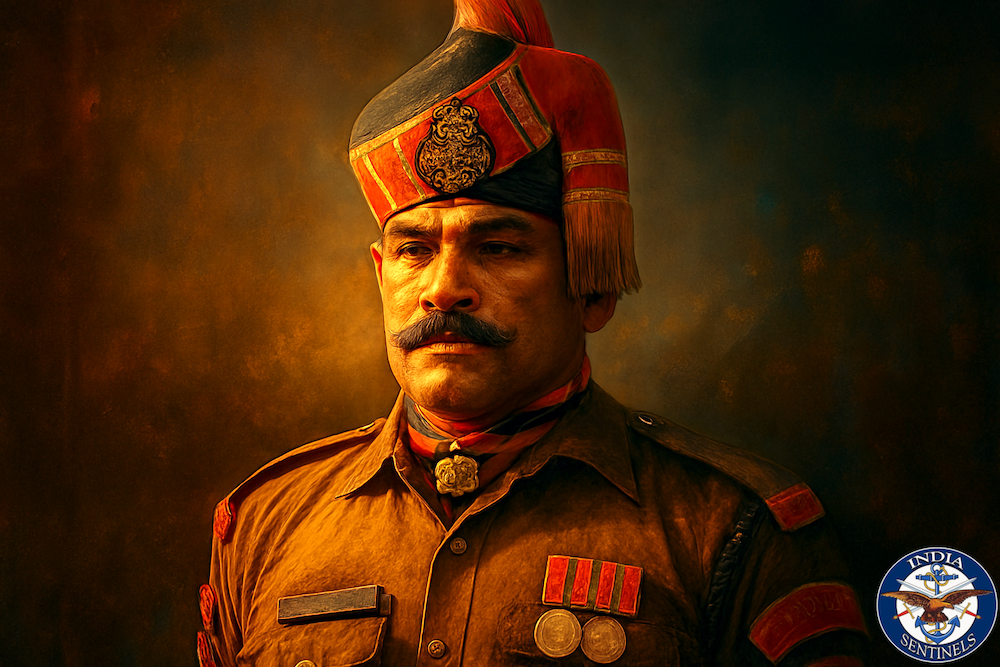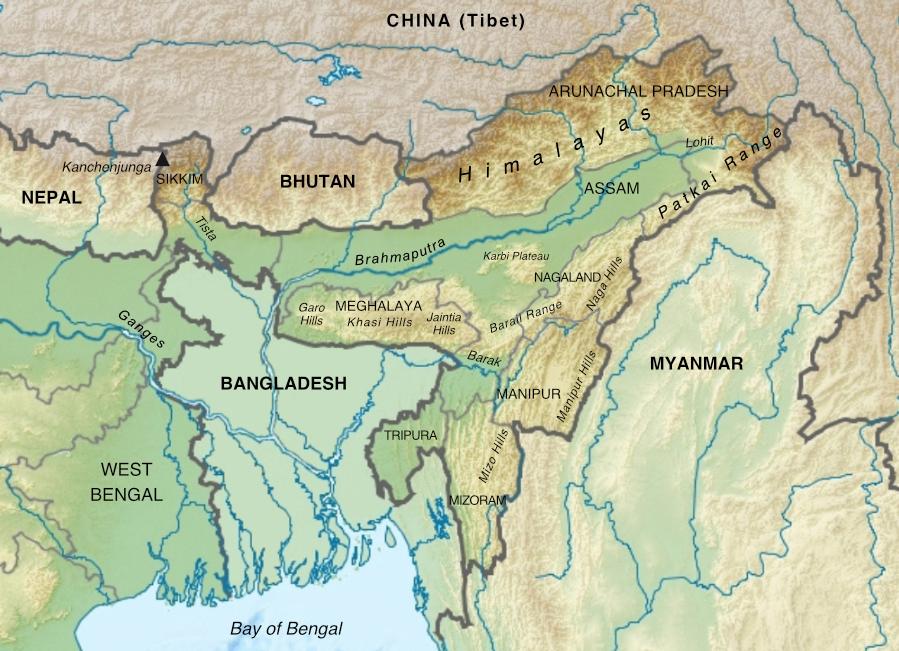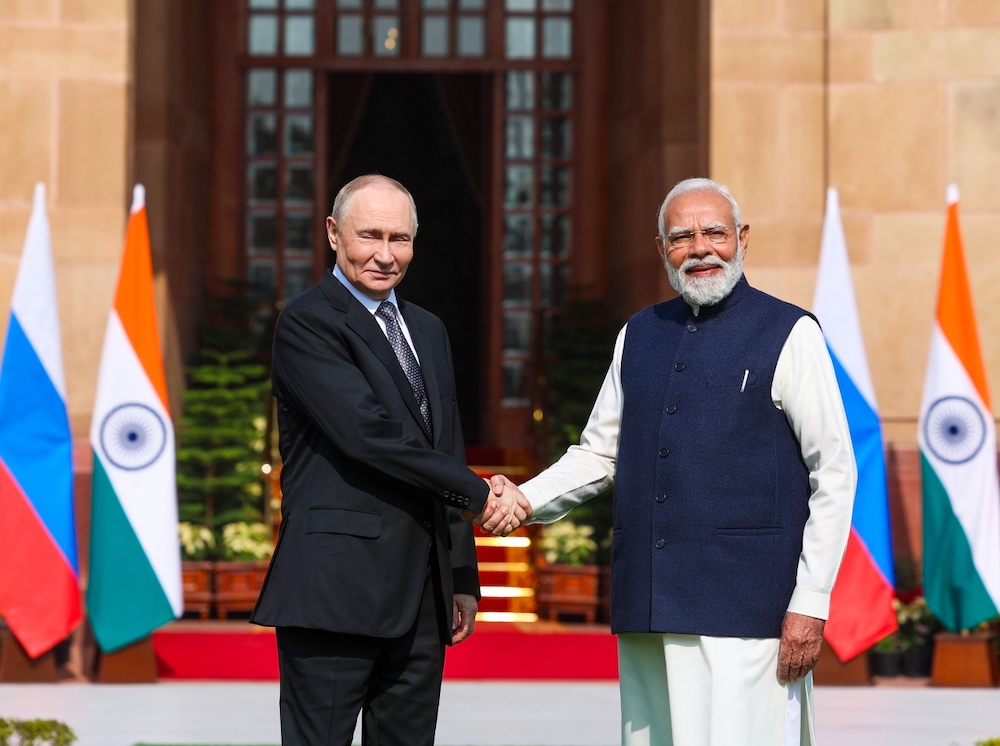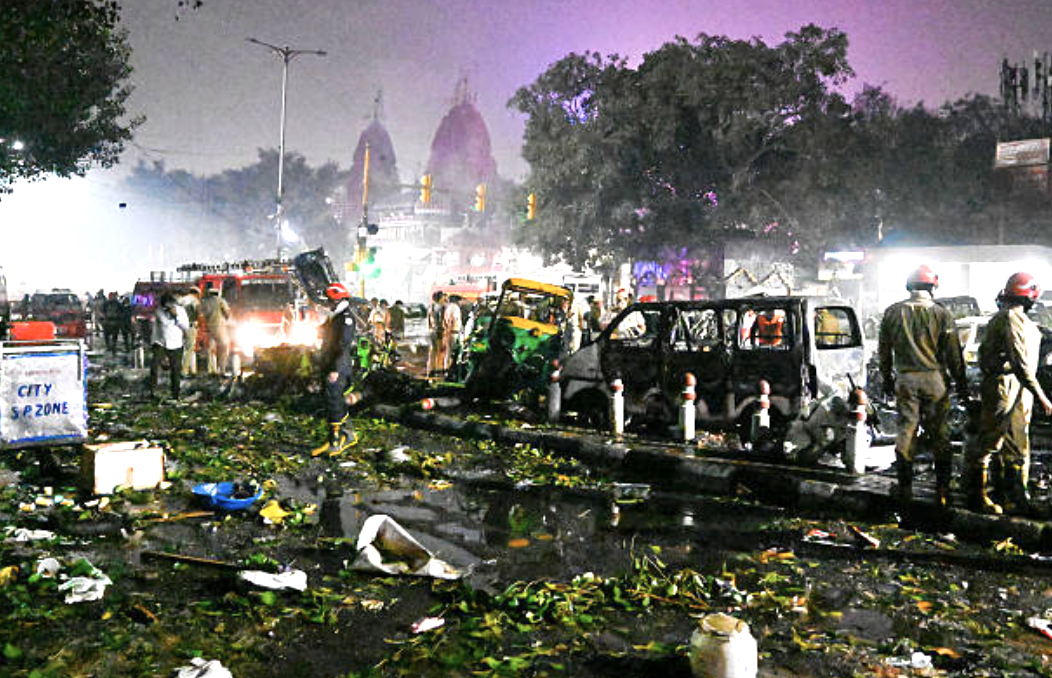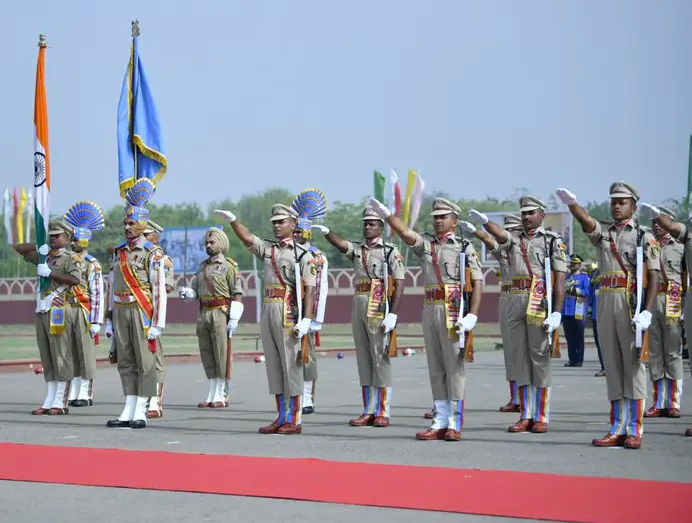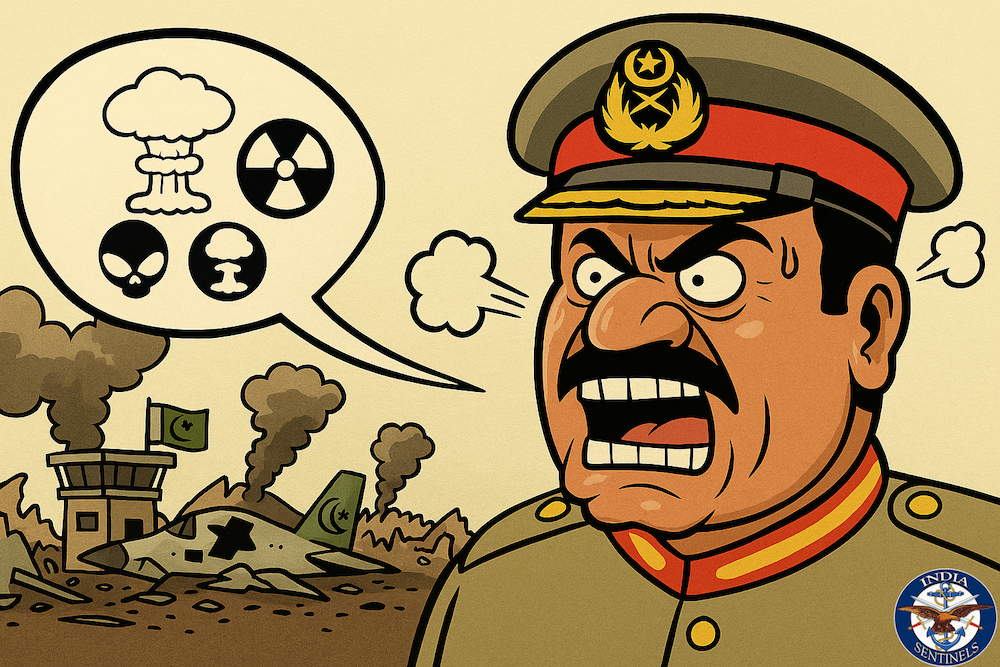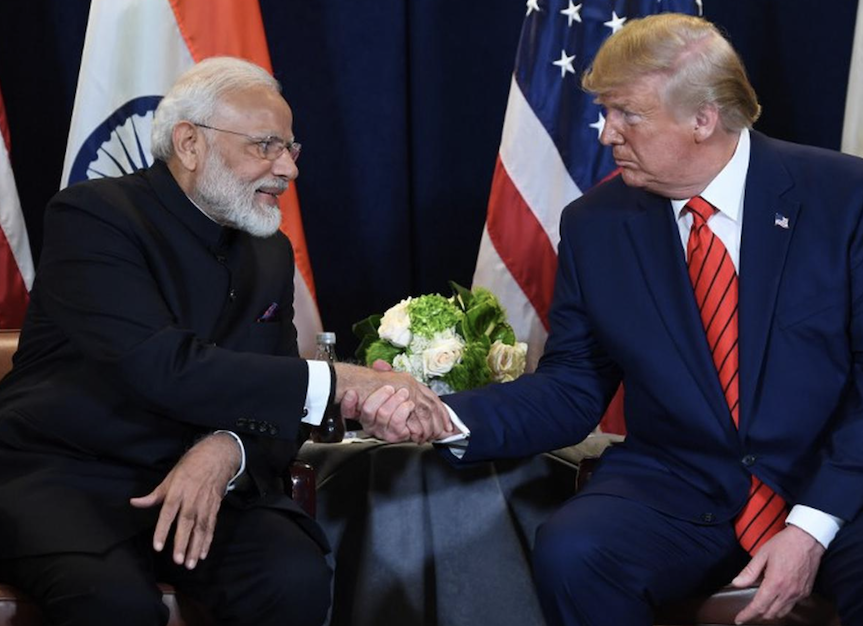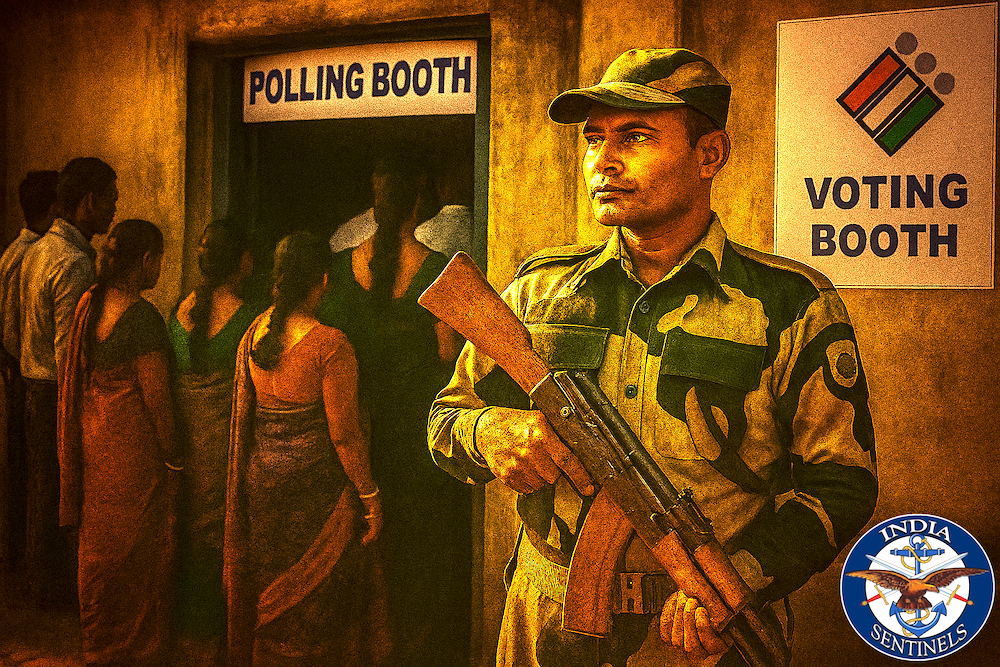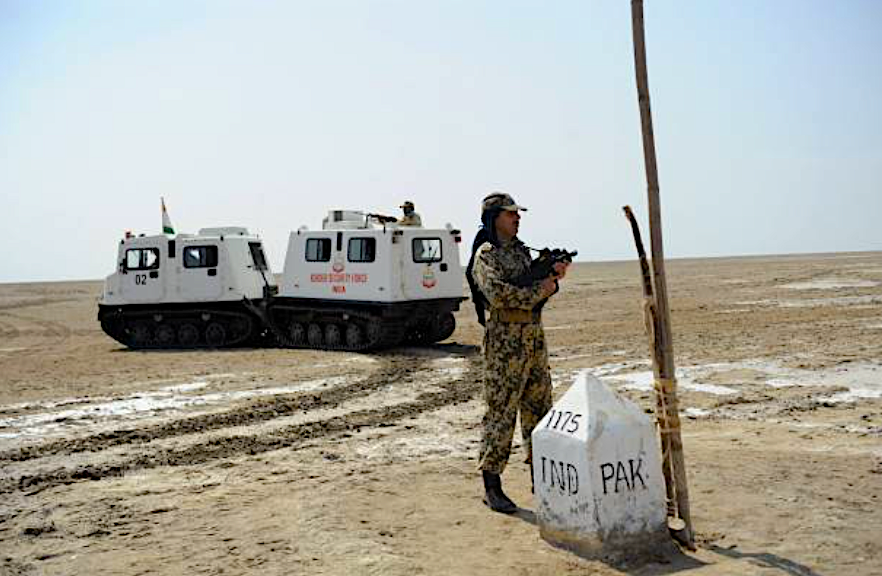 A BSF soldier stands guard at a border pillar with Pakistan in the Rann of Kutch during patrolling on a specialized all-terrain vehicle. (File photo)
A BSF soldier stands guard at a border pillar with Pakistan in the Rann of Kutch during patrolling on a specialized all-terrain vehicle. (File photo)
India’s western frontier with Pakistan – stretching across Jammu & Kashmir, Punjab, Rajasthan, and Gujarat – presents a complex security paradigm that demands urgent recalibration of national priorities. This 3,323-kilometre boundary comprises both de jure international borders (IB) and de facto working boundaries, each carrying distinct security implications that have been inadequately addressed by policymakers.
Blurred Line Between Peace and Combat
Traditionally, India’s security establishment has treated international borders as inherently peaceful while viewing working boundaries as hypersensitive due to their disputed nature. This artificial distinction has led to a misallocation of resources and a reactive rather than proactive national response strategy. The combat environment along the Pakistan border, shaped by local dynamics and adversarial tactics, demands an aggressive, forward-looking approach that transcends these outdated categorizations.
The lackadaisical national response is most evident in resource allocation for border defence infrastructure. International borders, despite forming the majority of the physical boundary, receive inadequate government prioritization. This stems from the Border Security Force’s higher leadership’s inability to convince bureaucratic and political decision-makers of the western border’s inherently unstable and unpredictable character.
Read also: Decoding Pakistan’s strategic gambit under Field Marshal Asim Munir
The BSF leadership must abandon its myopic view of borders through the narrow lens of surveillance and transborder crime control. Recent operational experiences, particularly following significant security incidents, demonstrate that the western international border requires evaluation through a military mindset rather than a policing framework.
From Policing to Military Doctrine
The distinction between working and international borders along Pakistan has progressively blurred, becoming virtually indistinguishable in terms of violence and internal turmoil following recent military operations. This reality necessitates that BSF leadership shed its policing mentality and develop combat instincts aligned with military doctrine across the entire western border south of the Chenab river to Gujarat.
The government must acknowledge the unstable nature of India’s western border and fundamentally reprioritize its security needs. This recalibration, recognizing the unpredictable nature of Pakistan as a neighbour, will enable the BSF to maintain constant readiness and better prepare for both peacetime border combat and wartime army support operations.
Read also: Border Security Force is an armed force, not police, nation must know
Such reprioritization would facilitate seamless transition from peacetime combat roles to wartime responsibilities without operational disruption, ensuring preparedness for prolonged conflicts lasting 15–20 days. Interactions with BSF veterans and ground-level experience consistently highlight that international borders face greater and more multidimensional threats while remaining low priority in peacetime border security paradigms – a deficiency that compromises conventional wartime preparations.
Bridging Critical Resource Gaps
The western border from the Chenab river to the Rann of Kutch suffers from extensive drug- and arms-smuggling operations that vary in intensity across different sectors. These activities aim to destabilize borders and create economic and political turmoil through the infusion of narcotics and weapons into Indian society, requiring immediate intervention at war footing.
While the BSF has largely contained land-based smuggling routes, aerial infiltration remains a significant concern requiring enhanced resource allocation. The entire western border requires comprehensive counter-drone systems to eliminate smuggling and intelligence gathering through unmanned aerial vehicles.
Read also: BSF must brainstorm to meet dynamic battle challenges
The BSF should be equipped and trained with air-defence systems at strategic locations to counter unmanned combat aerial vehicles before they strike population centres near the border, particularly in Jammu and Punjab. Recent incidents involving Turkish Bayraktar drones targeting various locations underscore this urgent requirement.
Additionally, the BSF requires systems for deep reconnaissance within adversarial territory for intelligence gathering, artillery guns for direct firing roles (especially along the Jammu border), and upgraded mortars with enhanced lethality. Continuous maintenance of existing border infrastructure represents an ongoing operational necessity.
Leadership Transformation for Combat Readiness
Reorienting leadership requires accepting that border combat fundamentally differs from policing operations. Border security constitutes 24/7/365 combat operations executed by personnel under constant threat. The command structures must adapt to the changing ground reality of military-nature border combat.
Read also: How BSF’s ‘offensive defence’ thwarted Pak’s designs during Op Sindoor
The BSF must restore the sanctity and effectiveness of tactical groups for enhanced regimentation and professionalism. The current loose and fragmented compositions dilute both regimental discipline and operational effectiveness.
The higher leadership must think professionally with military mindset regarding combat and administrative issues affecting operational functioning. The leadership should demonstrate professional competence in understanding military plans, requiring enhanced liaison with the military leadership – achievable only through comprehensive training in border-combat operations and warfare aspects.
Postings at higher command echelons in sensitive and highly active areas require rigorous professional scrutiny. The policing mindset proves unsuitable for border guarding during both peace and war, necessitating thorough analysis of leadership performance along the western border to identify corrective measures.
Training Revolution for Modern Warfare
Training forms the bedrock of discipline and professionalism, requiring comprehensive revision based on recent operational lessons. Each individual and subunit must undergo individual and collective training cycles ensuring battle-worthiness of subunits and units.
Read also: Was Op Sindoor ceasefire premature? Analysing its strategic impact
With the changed combat scenario and the emergence of the entire western border as unstable, training curricula at unit and institutional levels require fundamental revision. Greater emphasis must be placed on warfare operations, peacetime border combat scenarios, and peacetime administration for enhanced war preparedness.
This includes strengthening administrative procedures for ammunition replenishment chains, casualty evacuation protocols, and equipment repair and recovery procedures. The transformation demands shedding the police mindset throughout the hierarchy, physically and mentally reorienting personnel and command structures with combat mindset through rigorous training programmes.
The Path Forward
The BSF has consistently ensured sovereignty and territorial integrity of western borders during both peace and war, displaying exceptional courage during the 1971 war. Recent operational experiences demonstrate that BSF battalions and execution-level command remain prepared for all eventualities.
Read also: Pahalgam is a wake-up call to shed myopic view on J&K proxy war
However, recent military operations have provided valuable lessons highlighting the need to abandon policing mindset in functional operations. These experiences present opportunities for revisiting training methodologies at unit and institutional levels while emphasizing regular training requirements.
The government and BSF leadership must recognize these evolving needs and implement appropriate professional upgradation measures. The transformation from a border guarding force with policing characteristics to a combat-ready organization capable of seamless peace-to-war transition represents not merely an operational necessity but a strategic imperative for national security.
India’s western border-security paradigm requires fundamental restructuring that acknowledges the evolved threat landscape while providing adequate resources, professional leadership, and comprehensive training. The artificial distinction between international and working borders must be abandoned in favour of a unified approach that treats the entire western frontier as a potential combat zone requiring military-level preparedness.
Read also: India must consolidate its western front to tame Pakistan
This transformation demands political will, bureaucratic support, and professional commitment from the BSF leadership to ensure that India’s western borders remain secure while the force maintains readiness for both peacetime challenges and wartime responsibilities. The stakes are too high for anything less than total commitment to this essential national security imperative.
Disclaimer: The views expressed in the article are the author’s own and don’t necessarily reflect the views of India Sentinels.
Follow us on social media for quick updates, new photos, videos, and more.
X: https://twitter.com/indiasentinels
Facebook: https://facebook.com/indiasentinels
Instagram: https://instagram.com/indiasentinels
YouTube: https://youtube.com/indiasentinels
© India Sentinels 2025-26

